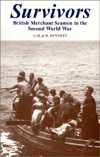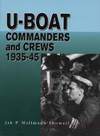Survivors
British Merchant Seamen in the Second World War
Bennett, G. H. and Bennett, R.
1999, Hambledon Pr
ISBN 1852851821
Hardcover, 287 pages
| Type. | Scholarly Analysis |
| Pros. | Excellent analysis of the topic |
| Cons. | None to speak of |
| Rating. |  |
 This is a fascinating scholarly work which exhaustively treats all aspects of the survival of British merchant seamen who experienced the loss of their vessels in World War II, moving beyond the figures of tonnage sunk and ships lost to examine individual experiences as well as factors influencing survival, improvements in safety and preparation for such disaster over the course of the war, and the nature and strategies of the opponents carrying out the attacks. Coverage is mainly German and U-boats, but also includes surface raiders and Italian and Japanese submarine attacks.
This is a fascinating scholarly work which exhaustively treats all aspects of the survival of British merchant seamen who experienced the loss of their vessels in World War II, moving beyond the figures of tonnage sunk and ships lost to examine individual experiences as well as factors influencing survival, improvements in safety and preparation for such disaster over the course of the war, and the nature and strategies of the opponents carrying out the attacks. Coverage is mainly German and U-boats, but also includes surface raiders and Italian and Japanese submarine attacks.
Well-organized and excellently written, the book includes many first person accounts, official reports, newspaper articles, and other primary sources. Numerous statistics and results of studies on various aspects of sea survival are also included.
Chapter 1 begins with the sinking of the Athenia, using that incident as the basis for a discussion of international law and the problems of survival. The early days of the war when the Prize Rules could still be observed, and early changes in German policy, are described. Here we are treated to the first of many intriguing stories of the behavior toward survivors of little-known U-boat commanders, as well as more famous ones, as evidenced by survivor accounts. Thus here, as in later chapters, we learn of commanders who aided survivors by giving them food, water, and medical care, ensuring they got safely into lifeboats or onto neutral ships; as well as of commanders who ignored survivors, and commanders who behaved in a hostile manner.
Several chapters analyze the specific ways in which merchant seamen met their deaths when their ships were sunk. The five main causes of death before leaving the ship turned out to be direct fire of the enemy; being trapped belowdecks; hazardous cargo; delaying abandonment; and accidents launching lifeboats/rafts. Further chapters study the causes of death among men who managed to leave the ship based on whether they subsequently did or did not get into a boat or onto a raft.
A great deal of the book analyzes the countermeasures, private and official, taken to try to diminish deaths in some of these scenarios, from better lifejackets and cold weather survival suits, to lifeboats equipped with motors and radios. Excerpts from Admiralty records provide the opinions, not always positive, of those who had to make use of this paraphernalia.
The book includes an analysis of the Peleus Affair and other incidents in which survivors accused U-boats of shooting at them while they were attempting to leave the vicinity of the ship under attack. Examples of chivalry, indifference, and hostility on the part of German, Italian, and Japanese commanders towards survivors; the conduct of surface raiders (which could take on survivors) versus U-boats (which could not); the degree to which U-boat commanders adhered to the Laconia order; and the charges leveled at Dönitz at Nuremberg, are all discussed.
The authors end with a call for a monument in London to the Merchant Navy in the form of a statue representing survivors on a raft. Having read the book, one feels it is well deserved and long overdue. After all, as noted early in the book, “Out there [at sea], grand strategy and the concept of the tonnage war came down to the determination of frightened men to survive and their willingness to continue the battle. Without their bravery, their resilience and their fortitude in the face of all hardships, the Battle of the Atlantic could not have been sustained.”
Review written by Tonya Allen.
Published on 19 Dec 2001.
This title is highly recommended.
Purchase information: (info) Get Survivors now at amazon.com ($ 85.26)
Get Survivors now at amazon.com ($ 85.26) Get Survivors now at amazon.co.uk
Get Survivors now at amazon.co.uk
Return to our main review page.



